 |
| |
e-newsletter of the Centre for Environment Education |
|
|
 |
| March, 16 -31, 2013 |
|
 |
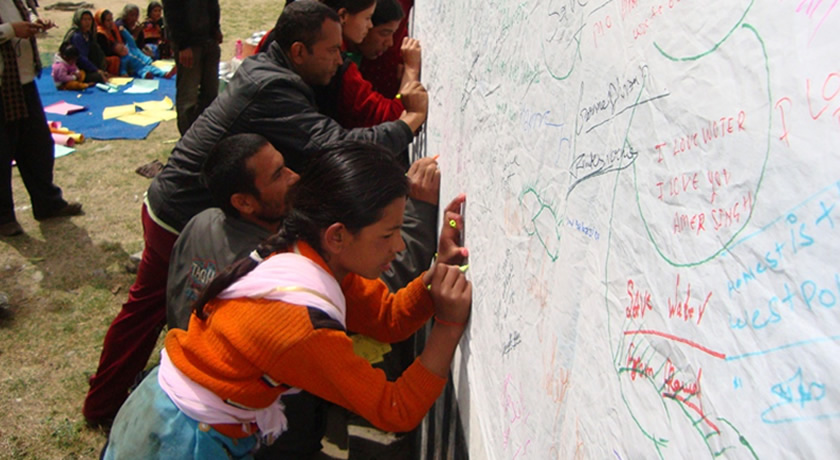 |
| Participants at Pathiyasar Village write ‘green’ pledges |
 |
|
| Celebrating Three International Days in Uttarakhand |
|
World Water Day, World Forestry Day and World Meteorological Day, 2013 were celebrated simultaneously in Uttarakhand at villages Jhuni, Khal Jhuni and Pathiyasar, Bageshwar, on March 21, 22 and 23, respectively, by CEE Himalaya under the UNDP-GEF project on the conservation and sustainable use of medicinal and aromatic plants (MAPs) of Uttarakhand. The events were hosted in collaboration with RCE Srinagar and local NGO Lok Chetana Manch.
The themes of the three days were very relevant to mountain communities and were adapted to the local context of the villages. The events were attended by around 350 people who discussed rapidly melting glaciers and erratic rainfall patterns adversely effecting crop cultivation and MAPs in these mountain villages. They discussed the impact of climate change on their lives, livelihoods, forests and other natural resources. They also voiced their concerns about increased competition for natural resources, especially water, land and forests, leading to the disintegration of their traditional way of life and resulting into high labor migration.
The audience also participated in slogan writing; wall painting and pledge writing activities, and games like ‘web of life’ and ‘nature love’ that enabled them to express themselves freely through different media. |
 |
|
| Safe Holi Campaign at Rajasthan |
|
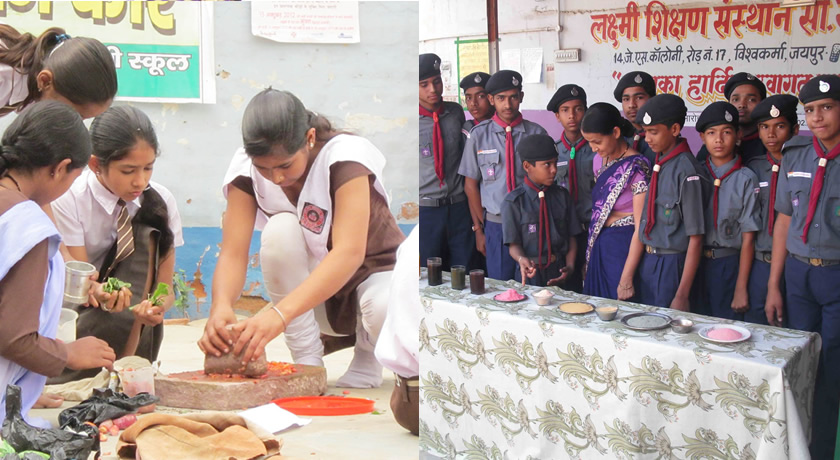 |
Students demonstrated how to make colours from different parts of plants. |
 |
|
Paryavaran Mitra from Rajasthan joined the Safe Holi Campaign, under its Culture and Heritage theme,to celebrate the festival of colours in an eco-friendly manner. Students prepared a variety of natural colours from the plant products commonly available at home like seasonal vegetables, species, flowers, leaves, etc. and then displayed them to popularize its use among the local community. This enthused others in their families, and neighbors, to play a eco-friendly Holi. An interactive session was also held linking the action with other cross cutting topics like water and soil pollution, impact on health and threats to local biodiversity. In all 850 eco-club members participated in the campaign. |
 |
|
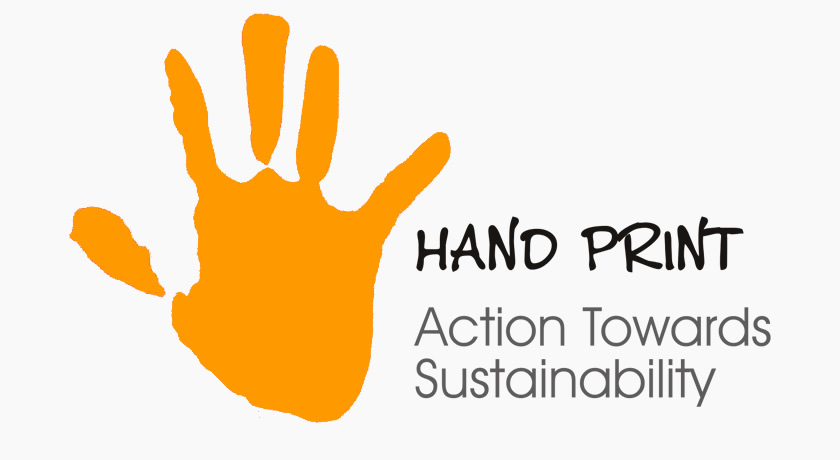 |
| |
 |
| |
CEE is the ENVIS centre on Environmental Education (EE). As an ENVIS centre, CEE caters to the information needs of environmental educators. Write to the CEE ENVIS Centre at [email protected]
|
| |
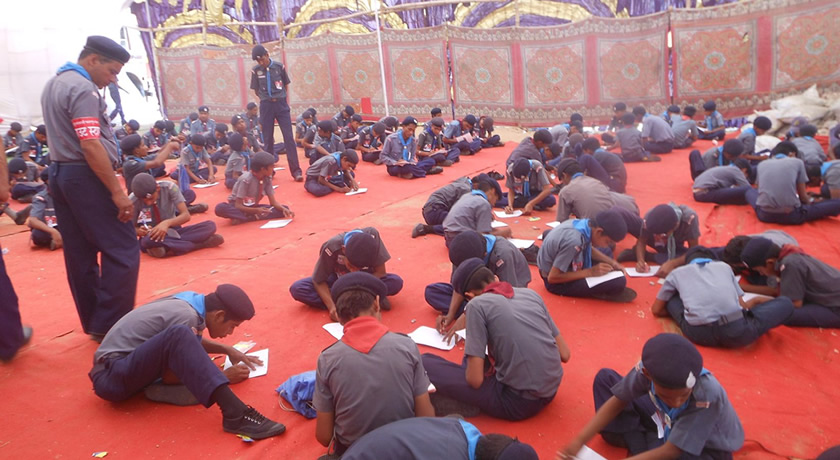 |
| The event saw the participation of 1500 students from 100 eco-clubs of the district. |
 |
|
| World Water Day Celebrations at Sikar |
|
Acknowledging the UN International Year of Water Cooperation, CEE Jaipur celebrated World Water Day on March 22 at Sikar in partnership with the Rajasthan State Bharat Scouts & Guides. A series of thematic competitions were conducted, including essay writing, slogan writing, quiz and poster making, along with actiitis and games through which the participants depicted their ideas related to issues like quality, quantity, availability, and management of water. Children also pledged to mobilize the community to save water by playing ‘Tilak Holi’ for a greener future and a better environment. The programme culminated with prize distribution to winners of the competitions. |
 |
|
Vibrant but Safe Holi |
|
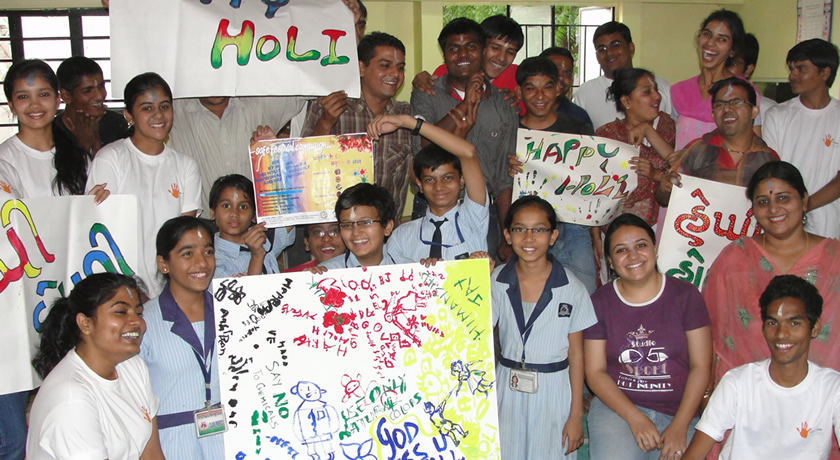 |
Children–the best messengers for spreading the Safe Holi Message. |
 |
|
Holi, the vibrant festival of colours spreads the message of interfaith harmony. Unfortunately, the colours that are available in the market are synthetic and it is harmful not only for us but also for the environment. Therefore, it is important that the message of using natural colours is promoted among the masses. Taking this initiative forward, the Youth Environment Network at CEE and the Information Facilitation Centre at CEE launched the Safe Holi Festival Campaign on March 19.
The campaign involved young volunteers who visited schools, colleges, public places with an objective to sensitise them towards the detrimental effects of chemical colours on environment and health. The campaign also included demonstrations and homemade tips for making holi colours.The campaign was conducted in association with AURA Herbalwear.
As a part of this campaign, the team also visited Samarpan Professional Unit (sister concern of Blind People’s Association) and SAATH Child Development Centre, Vasna on March 23 and 24 respectively.
At the Samarpan Professional Unit, the idea of making natural colours was introduced to the students of the institute. The campaign was integrated with the vocational training programme of the institute. This added towards developing the youth’s entrepreneurial and livelihood skill. This gave them access to employment and created job opportunities for themselves. Activities like canvas painting, green tattoo were also conducted.
At the Gyanshala, SAATH Child Development Centre, Vasna Ahmedabad, children from the economically challenged sections of the society participated in this event. Students from HB Kapadia, Ahmedabad participated as volunteers and helped in demonstrating the preparation of natural colours, and in organizing games and fun activities for these children. The day ended playing tika holi with children reinforcing the message of making Holi an eco-friendly festival.
|
|
|
 |
|
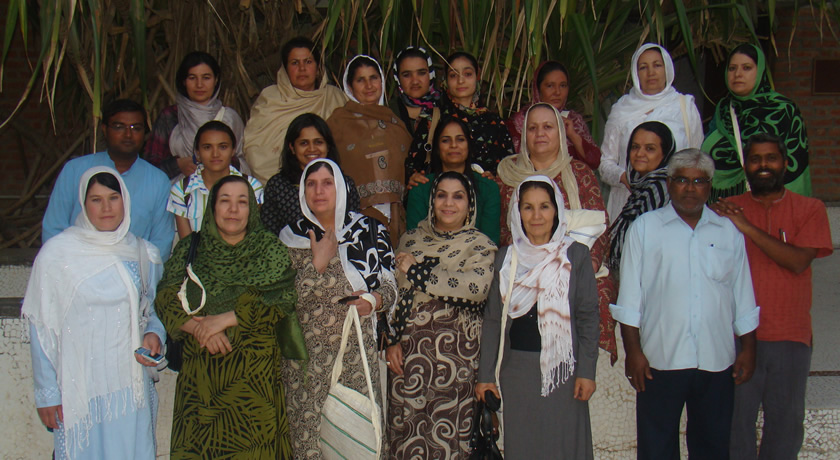 |
| The participants included teachers, school consultants, and education managers from six provinces of Afghanistan. |
 |
|
| Strengthening Quality Education in Afghanistan |
|
Afghanistan today is at the dawn of a social rebuilding process. Emerging from a long drawn socio-economic and political struggle, the nation is in a reconstructive phase. This phase is a critical opportunity for innovating ideas and establishing systems for building a peaceful and sustainable society, and Education has a key role to play. As the fundamental unit of the formal education system, the schools of a nation thus have the mission of helping and guiding children become responsible citizens of tomorrow.
It is with this mission and the felt need of strengthening quality education in Afghanistan |
that a group of 16 women teachers, school consultants and education managers, from six provinces of Afghanistan, were in Ahmedabad for a two-week Training-cum-Study Tour.
The two week programme (March 13-23) was organized by the Networking and the Capacity Building Unit of CEE. The Programme has its background in the belief that ‘Education is the foundation of a society’s progress.’ Facilitating learning and teaching in a way that helps young learners become thinking, compassionate and creative individuals, qualifies to be a good learning process. Experiences, practices and observations, were planned and executed to provide a ‘wholesome adult learning process’ for these 16 women, who were selected to be trained as a strategy to promote girl-child education in Afghanistan.
This programme was supported by the Swedish Committee for Afghanistan (SCA), a non-governmental organization, working to help rebuild Afghanistan after decades of war and destruction.
|
|
 |
|
| A Dialogue on School Education for Sustainable Development |
|
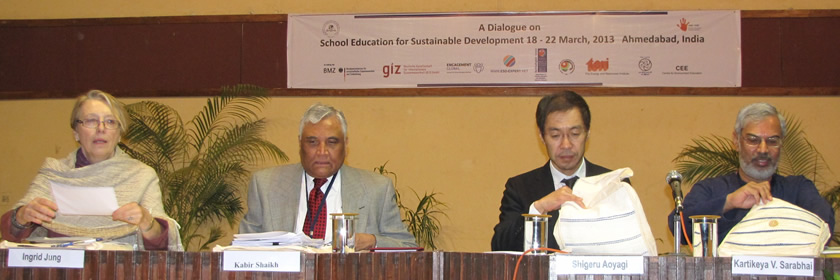 |
| The inaugural session was addressed by Dr
Ingrid Jung, Mr Kabir Shaikh, Mr Shigeru Aoyagi, and Mr Kartikeya Sarabhai. |
 |
|
Educational experts from Germany, Mexico, South Africa and India met at CEE for a ‘Dialogue on School Education for Sustainable Development’ from 18th to 22nd March 2013. The event was a part of the meeting of the ESD Expert Net, a trans-national network that focuses on Education for Sustainable Development (ESD). Currently, experts from four countries are members of the network: Germany, India, Mexico and South Africa. CEE is also a member of the ExpertNet.
The event was inaugurated by Mr Shigeru Aoyagi, Director and UNESCO Representative to India, Bhutan, Maldives and Sri Lanka and Dr. Kabir Shaikh, Director, UNESCO Mahatma Gandhi Institute of Education for Peace and Sustainable Development, New Delhi.
The conference included sessions on:
- ESD for Biodiversity Conservation
- Gandhian Way and ESD
- Beyond the Decade of Education for Sustainable Development
Whole School Whole System Approach
The GIZ supported ESD ExpertNet has developed a Course for Multipliers on ‘ESD using the Whole School Approach’, including a core curriculum, methods and materials.
The Whole School approach takes into account that the important factors for success of ESD within the school context are not only curriculum (both explicit and implicit), the school physical environment, the school culture and ethos, and equally the parents, the larger community, and local surroundings; education policies; teaching materials and many other aspects that all play a major role in the success of ESD. CEE has adapted this course for use in India. The course was offered at CEE Ahmedabad from 18 to 22 March 2013, in parallel with the meeting of the ESD ExpertNet.
Submission to UN Secretary General's ' Education First' Initiative
The ESD ExpertNet, the workshop participants and CEE jointly prepared a submission to the UN Secretary General's 'Education First' Initiative, commending the initiative for recognising education as a major driver of change and drawing attention to the lessons from the Decade of ESD which could support the 'Education First' Initiative. In particular, the submission pointed to the role of action-based, experiential learning in nature, recognizing the role of both modern science and indigenous knowledge, the need for schools to reflect the ethics and values appropriate to sustainable development, encouraging students to participate in ' handprint' activities which are positive actions towards sustainability and support to students to develop competencies for sustainable living and of teachers for ESD. |
|
 |
|
| |
|
 |
This message is sent to you by Centre for Environment Education, Thaltej Tekra, Ahmedabad, India and delivered by [email protected]
© CEE 2013 Editorial team: Mamata Pandya, Carol Dsouza, Design: Pankaj Gorana |
|
|
|
|